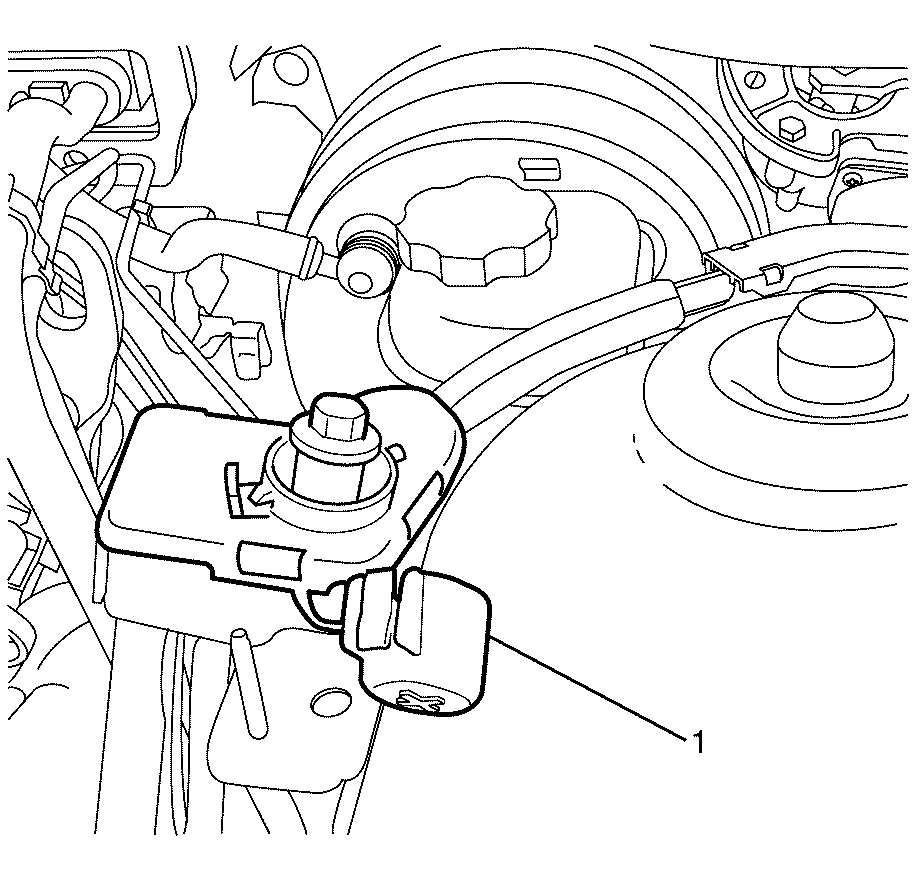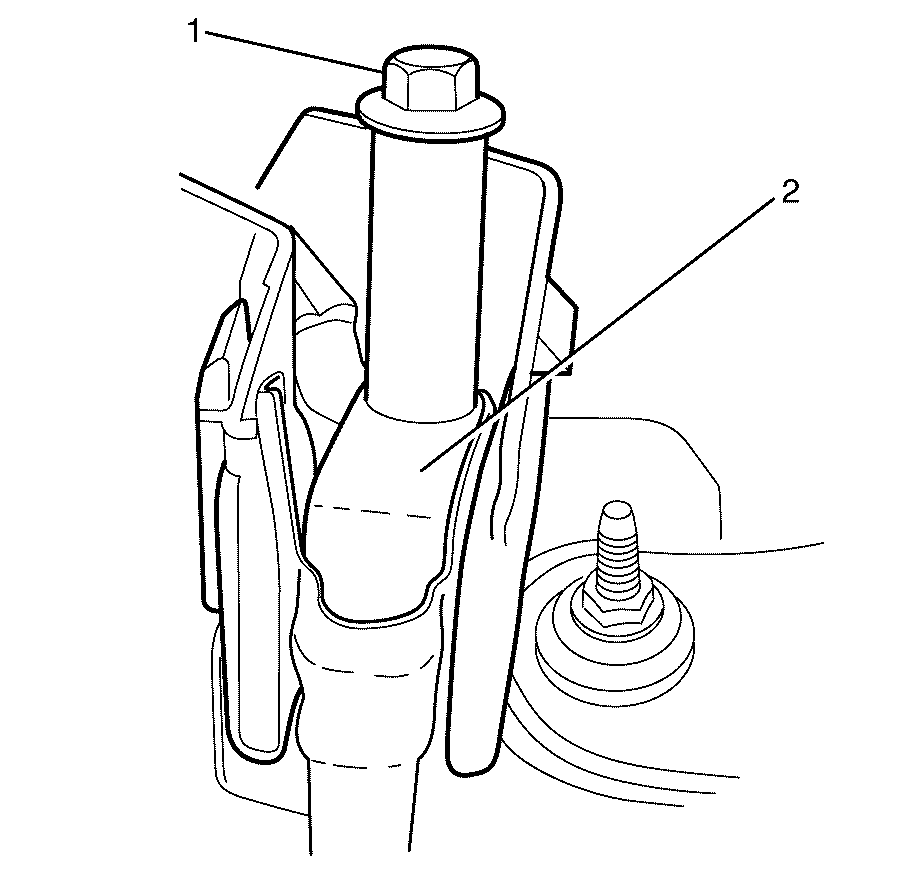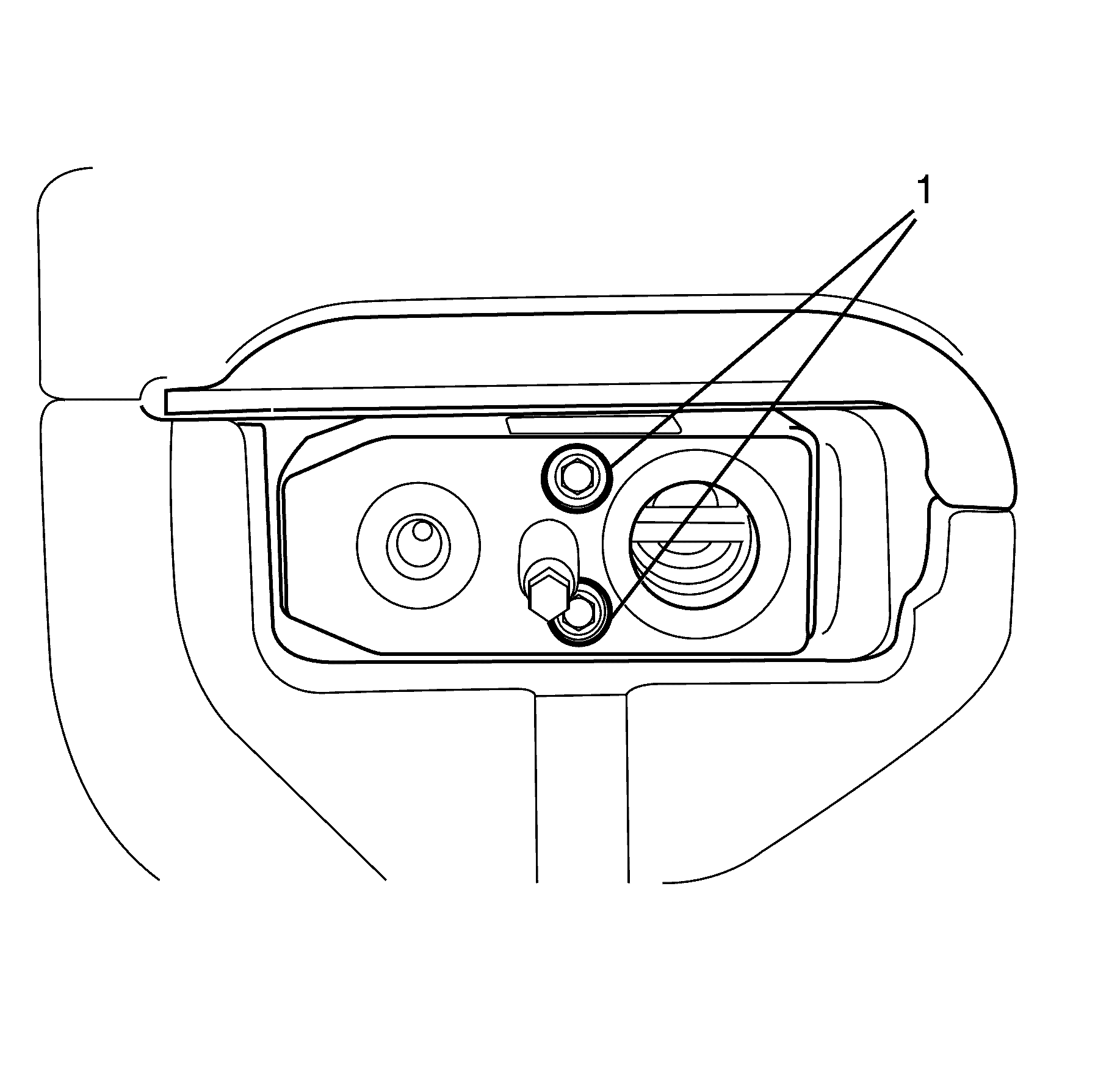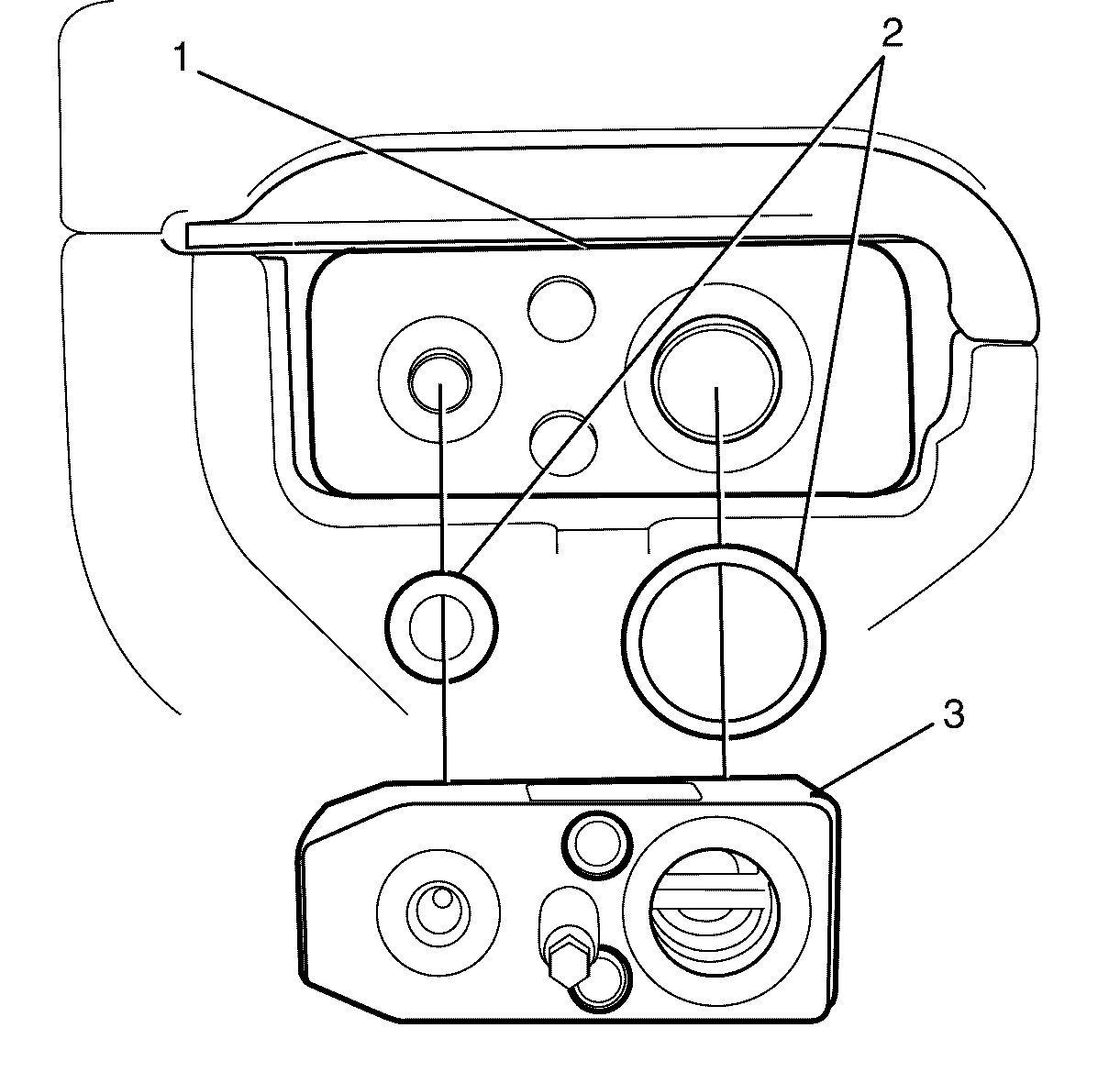Removal Procedure
- Remove the radiator air baffle and deflector. Refer to Radiator Air Upper Baffle and Deflector Replacement.
- Remove the engine cover. Refer to Engine Cover Replacement or Engine Cover Replacement.
- Recover the refrigerant Refer to Refrigerant Recovery and Recharging.
- Disconnect the battery negative cable. Refer to Battery Negative Cable Disconnection and Connection.
- Remove the air filter assembly. Refer to Air Cleaner Assembly Replacement or Air Cleaner Assembly Replacement.
- Disconnect the vacuum hose (1) and the vacuum brake booster check valve (3) from the vacuum brake booster (2).
- Detach the vacuum hose (1) from the bulkhead mounted vacuum hose retaining bracket (4) and position aside.
- Remove the remote battery positive post cover (1).
- Remove the remote battery positive post to wiring harness retaining bolt (1).
- Remove the starter motor power cable (2) and position aside.
- Remove the suction pipe upper to suction pipe lower retaining nut (1).
- Remove the suction pipe/liquid pipe retaining clip to left front chassis rail retaining bolt (3).
- Detach the liquid pipe (1) from the suction pipe/liquid pipe retaining clip (2).
- Disconnect the suction pipe upper (1) from suction pipe lower (2).
- Remove the sealing washer (3). Refer to Sealing Washer Replacement.
- Cap or plug the suction pipe upper (1) and the suction pipe lower (2).
- Remove the suction pipe/liquid pipe pad to TX valve retaining nut (1).
- Disconnect the suction pipe/liquid pipe pad (3) from the TX valve (1).
- Remove the sealing washers (2). Refer to Sealing Washer Replacement.
- Cap or plug the suction pipe (4) and liquid pipe (5).
- Remove the TX valve to evaporator pad retaining screws (1).
- Remove the TX valve (3) from the evaporator pad (1).
- Remove the sealing washers (2) from the evaporator pad (1). Refer to Sealing Washer Replacement.
- Cap or plug the evaporator pad (1) and the TX valve (3).
Warning: Refer to Safety Glasses Warning in the Preface section.
Warning: Refer to Battery Disconnect Warning in the Preface section.






Note: The sealing washer (3) is a single use item and must be discarded after use.
Discard the sealing washer
Note: Cover any opening of the A/C system with a suitable cap or tape immediately, to prevent absorption of moisture from the atmosphere.


Note: The sealing washers (2) are a single use item and must be discarded after use.
Discard the sealing washers
Note: Cover any opening of the A/C system with a suitable cap or tape immediately, to prevent absorption of moisture from the atmosphere.

Note: Using a suitable tool, unscrew the TX valve to evaporator pad retaining screws (1).

Note: If required, reinstall the suction pipe/liquid pipe to TX valve retaining nut to assist in the removal of the TX valve.
Note: Place the TX Valve in a plastic bag to avoid any contamination from air born dirt or moisture.
Note: The sealing washers (2) are single use items and must be discarded after use.
Discard the sealing washers
Note: Cover any opening of the A/C system with a suitable cap or tape immediately, to prevent absorption of moisture from the atmosphere.
Installation Procedure
- Remove the plugs or caps from the thermal expansion (TX) valve (3) and the evaporator pad (1).
- Install NEW sealing washers (2) to the evaporator pad (1). Refer to Sealing Washer Replacement.
- Connect the TX valve (3) to the evaporator pad (1).
- Install TX valve to evaporator pad retaining screws (1) and tighten to 4 N·m (35 lb in).
- Remove the plugs or caps from the suction pipe (4), liquid pipe (5) and the TX valve (1).
- Install NEW sealing washers (2). Refer to Sealing Washer Replacement.
- Position the suction pipe/liquid pipe pad (3) to the TX Valve (1).
- Install the suction pipe/liquid pipe pad to TX valve retaining nut (1) and tighten to 22 N·m(16 lb ft).
- Remove the plugs or caps to the suction pipe upper (1) and the suction pipe lower (2).
- Install a NEW sealing washer (3). Refer to Sealing Washer Replacement.
- Install the suction pipe upper (1) to the suction pipe lower (2).
- Attach the liquid pipe (1) from the suction pipe/liquid pipe retaining clip (2).
- Install the suction pipe/liquid pipe retaining clip to left front chassis rail retaining bolt (3).
- Install the suction pipe upper to suction pipe lower retaining nut (1) and tighten to 22 N·m( 16 lb ft).
- Install the starter motor positive cable (2) to the remote battery positive post (3).
- Install the remote battery positive post to wiring harness retaining bolt (1) and tighten to 15 N·m (11 lb ft).
- Install the remote battery positive post cover (1).
- Connect the vacuum hose (1) and the vacuum brake booster check valve (3) to the vacuum brake booster (2).
- Attach the vacuum hose (1) to the bulkhead mounted vacuum hose retaining bracket (5).
- Evacuate and recharge the A/C system. Refer to Refrigerant Recovery and Recharging.
- Install the radiator air baffle and deflector. Refer to Radiator Air Upper Baffle and Deflector Replacement.
- Install the air filter assembly. Refer to Air Cleaner Assembly Replacement or Air Cleaner Assembly Replacement.
- Install the engine cover. Refer to Engine Cover Replacement or Engine Cover Replacement.
- Connect the battery negative cable. Refer to Battery Negative Cable Disconnection and Connection.
- Leak test the thermal expansion valve pipe connections. Refer to Leak Testing.

Note: DO NOT coat the NEW sealing washers (2) with oil, they must be fitted dry. The use of mineral oil will render the sealing washers (2) useless, as the sealing washers (2) WILL swell causing refrigerant to leak out.
Caution: Refer to Fastener Caution in the Preface section.


Note: DO NOT coat the NEW sealing washers (2) with oil, they must be fitted dry. The use of mineral oil will render the sealing washers (2) useless, as the sealing washers (2) WILL swell causing refrigerant to leak out.


Note: DO NOT coat the NEW sealing washer (3) with oil, they must be fitted dry. The use of mineral oil will render the sealing washer (3) useless, as the sealing washer (3) WILL swell causing refrigerant to leak out.




Note: Make sure the clips on the remote battery positive post cover (1) are engaged to avoid an induced rattle condition.

